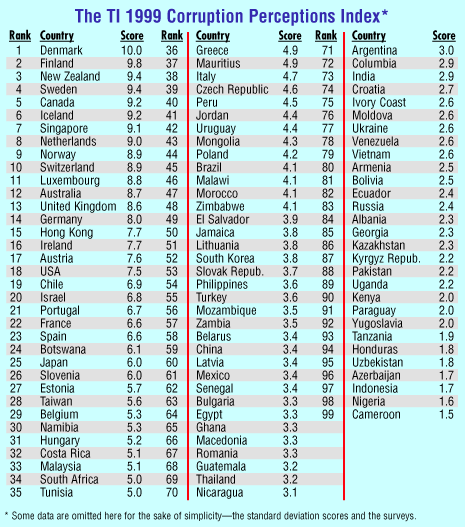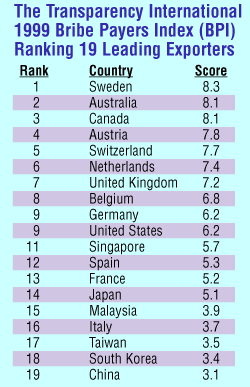 |
||||

|
||||
|
With the increasing globalization and interdependency of businesses around the world, multinational corporations must confront diverse cultural practices and business climates. In some instances, the main obstacles are simply a question of foreign language translation. But increasingly, the challenges stem from cultural clashes and, in particular, from unethical business practices. As with any enormous challenge, the single most effective weapon is awareness, knowledge gained through educational efforts. We wholeheartedly support moves to raise the level of public awareness about business corruption. Changes in business practices globally will only occur when target populations have been properly educated about the advantages of ethical practices.
One organization’s efforts to raise ethical standards are noteworthy. Transparency International is a highly respected non-governmental organization dedicated to increasing the accountability of governments and businesses and to curbing corruption. Its information-gathering network has produced yearly assessments of bribery and corruption among many countries. Recently, this group released its Annual Report for the year 2000. According to the report data, conveniently summarized in the "Corruption Perception Index (CPI)," Greece ranks 36th out of 99 countries in terms of perceived levels of corruption among public officials. The CPI reflects only one aspect of a very complex picture: bribes received by governments and their officials. What the CPI does not rank, however, may be just as important. Countries of origin are not reported for individuals or businesses committing bribery, nor are there projections or extrapolations for countries whose citizens or businesses are most likely to offer bribes. Nevertheless, Transparency International offers another set of statistics from which readers may extrapolate this data in a general way. Using the "Bribe Payers’ Index (BPI)" of countries most likely to pay bribes, one can reasonably ascribe to individuals a ranking similar to their countries, based on the assumption that the actions of governments reflect the cultural climate in which their citizens and businesses operate. Although Greece ranks 36th in the CPI, she fares very well in a broader examination of her standings among the entire sphere of the Balkans and Southeastern Europe. Sixty-three other countries fall behind her in the international rankings, among them Italy, the Czech Republic, the Slovak Republic, Former Yugoslav Republic of Macedonia, Romania, Albania, Yugoslavia,
On the other side of bribery are those countries that are most likely to pay bribes to win or retain business, as evidenced by their BPI’s. Those business sectors most likely to accept and extort bribes were associated with public works contracts and construction, arms and defense industry, power (including petroleum and energy), and industry (including mining). Unfortunately, none of the Balkan countries was included in the BPI, an indicator that Transparency International must continue to expand upon its data collection methods. But one of the surprises in the BPI was the standing of the US, 9th out of 19, falling about midway between the first- and last-ranked countries, Sweden and China. What, therefore, can one readily infer from this data? Even the US needs to develop and institute programs designed to combat corruption. Transparency International has worked to establish chapters in every developed country. In February, the group held its first conference in Greece. Mr. Frank Vogl, the vice-chairman of Transparency International, urged Greeks to counter the corruption in the public life of their country. A former World Bank official, he said that everyone in Greece should be extremely concerned that Greece received a grade of less than five on a zero-to-ten point scale index for perceived corruption in last year’s annual CPI. Former Foreign Minister Virginia Tsouderou, now head of the Greek
Efforts to defeat corruption can be as simple as self-education, or as large and sophisticated as programs sponsored by multinational corporations. In one area of New England, interest in ethical business practices has had an enormous impact on developing academic curricula. Last December, the "Endowed Chair in Business Ethics" was established by Christos and Mary Papoutsy at Southern New Hampshire University. With strong community partnerships, the chair will serve as a cornerstone for an integrated program in business ethics. Through teaching, community lectures, and conferences, the chair will encourage the development of sound policies, the practice of moral values in business decisions that will result in healthy business relationships and partnerships. Corruption is one of the greatest challenges facing the contemporary world, particularly in the new "globalization" of world business. It undermines good government, distorts public policy, leads to the misallocation of resources and harms the private sector. Most of all, though, corruption hurts those who can afford it least. Controlling corruption is only possible with the cooperation of all those who have a stake in the integrity and transparency of their institutions. By joining forces, international institutions, the state, concerned citizens and the private sector can defeat corruption. Stamping out corruption is about improving the lives of men and women everywhere. For more information about the German-based organization, Transparency International, visit their website at http://www.transparency.de. Additional details about the Chair in Business Ethics at Southern New Hampshire University, visit the Business Arena page of HellenicComServe website (http://www.HellenicComServe.com). |
||||
 |
||||
|
|
||||
 |
||||
